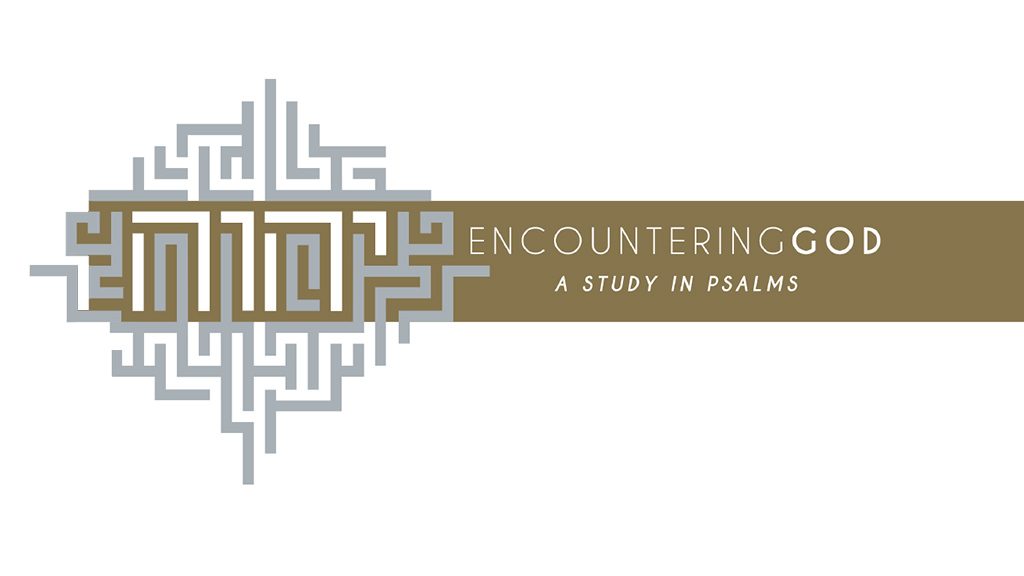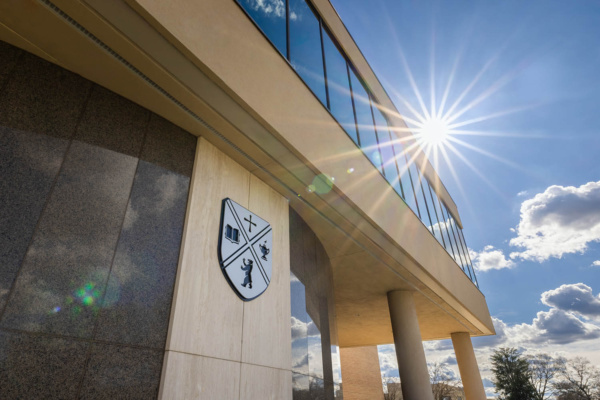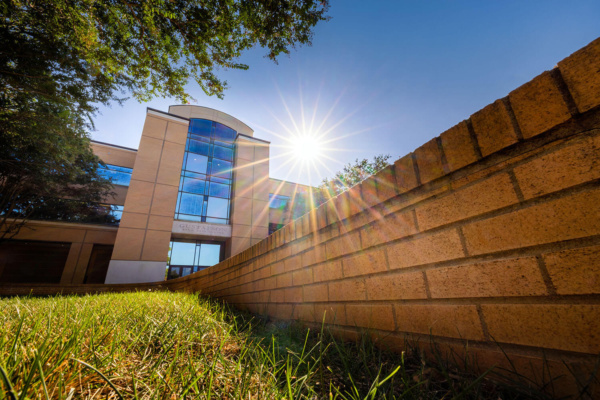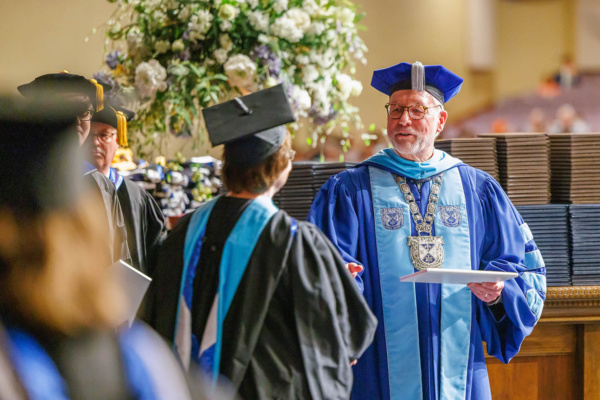Everyone needs a shepherd. We can’t go through life without one. We need someone who can guide our steps, guard us from danger, and lead us to places of nourishment and satisfaction. We need a shepherd.
If anyone understood shepherding, it was David. From his earliest years he tended his father’s flock (1 Sam. 16:11). Later God chose him to leave the sheepfolds to become king and shepherd of Israel (1 Chron. 11:2; Ps. 78:70). Throughout his own spiritual experience David testified that the Lord was his Shepherd. It should not surprise us that God chose David to author Psalm 23.
This psalm begins with a confident declaration: “The Lord is my shepherd.” The meaning of the name Lord is very important. This is God’s personal name. The Hebrew word is YHWH. It is often translated Jehovah or Yahweh and occurs over 6,800 times in the Old Testament. The Lord defined the meaning of His name to Moses by declaring, “I AM THAT I AM” (Exod. 3:14). In other words, He is the self-existing God. His existence depends on no one else. Rather everyone else depends on Him for their existence. Remarkably, in John 8:58, Jesus used this same sacred name to refer to Himself, when He said, “Before Abraham was, I am.” Jesus affirmed that He is the Lord of the Old Testament. He also identifies Himself as the Good Shepherd (John 10:11). So it is appropriate for Christians to say, “Jesus is my Shepherd.”
What does it mean for Jesus Christ to be our Shepherd? Psalm 23 describes seven ways.
He Owns Me
Psalm 23:1
The Lord is my shepherd.
To say “The Lord is my shepherd” does not mean that I own Him but that He owns me. The shepherd owns the sheep; they are his property. They are not wild animals like wolves. He purchases them at a price and cares for them with love.
What does it mean for Jesus to own us? First, as our Good Shepherd, Jesus paid the price of His own life for His sheep. He said, “I am the good shepherd: the good shepherd giveth his life for the sheep” (John 10:11). He laid down His life in death on a cross to purchase us from sin. This means we belong to Him: “Know ye not that … ye are not your own? For ye are bought with a price” (1 Cor. 6:19–20).
Second, as our Good Shepherd, Christ has taken responsibility to care for us forever. Jacob testified to God’s faithful ministry as his Shepherd: “God, before whom my fathers Abraham and Isaac did walk, the God which fed me all my life long unto this day” (Gen. 48:15).
We can be just as confident because Christ explained, “My sheep hear my voice, and I know them, and they follow me: and I give unto them eternal life; and they shall never perish, neither shall any man pluck them out of my hand” (John 10:27–28). Jesus is our Shepherd right now and for eternity!
He Provides for Me
Psalm 23:1
I shall not want.
This statement does not mean God gives us everything we want. The term want is a way of describing need. David affirms that we will never lack what we need. The Lord will always provide. Paul reaffirms this truth in the New Testament: “But my God shall supply all your need according to his riches in glory by Christ Jesus” (Phil. 4:19).
Jesus Christ taught that when we wonder whether or not God will meet our physical needs, we should ask ourselves a few questions from Matthew 6:25–30. Does God not feed the ravens? Does He not cause the lilies to grow? How, then, can He leave his children to hunger?
What about our spiritual needs? Does our Shepherd provide for them too? Consider how Christ counseled Paul in 2 Corinthians 12:9: “My grace is sufficient for thee: for my strength is made perfect in weakness.”
You may wonder, how can I be absolutely confident that God will faithfully supply all my needs? Because He has already provided your greatest need—His Son as your Savior! There is hardly a more uplifting verse in all of Scripture than Romans 8:32: “He that spared not his own Son, but delivered him up for us all, how shall he not with him also freely give us all things?”
He Gives Me True Peace and Satisfaction
Psalm 23:2
He maketh me to lie down in green pastures:
Sheep are fearful, nervous and insecure animals, always concerned about being fed and protected. The primary role of any shepherd is to take his sheep to places where they can be nourished and satisfied. He must also provide security from dangers and threats so that his sheep can lie down and be at rest.
The Lord promised to be this kind of Shepherd:
I will feed them in a good pasture, and upon the high mountains of Israel shall their fold be: there shall they lie in a good fold, and in a fat pasture shall they feed upon the mountains of Israel. I will feed my flock, and I will cause them to lie down, saith the Lord God. (Ezek. 34:14–15)
Unlike Israel’s spiritual leaders, the Lord ensures that His people experience true shalom, a peace and wholeness that this world cannot provide. Jesus assures His disciples, “Peace I leave with you, my peace I give unto you: not as the world giveth, give I unto you” (John 14:27).
Psalm 23:2
He leadeth me beside the still waters.
The word lead means to guide to a watering place and cause to rest there. The shepherd leads his sheep to waters of rest. Sheep will not drink water out of a rapidly flowing river. Often the shepherd would take stones and dam up the running waters in order to create an oasis of calm water for his sheep to drink. The shepherd provided all the essentials: food, water and rest.
Christ our Shepherd leads us, which means we have to follow Him. Following the shepherd requires great trust. It starts with knowing the shepherd’s voice and obeying his command. Jesus taught that following is what true disciples do. “My sheep hear my voice, and I know them, and they follow me” (John 10:27).
He Restores Me
Psalm 23:3
He restoreth my soul:
Sheep by nature struggle. They are easily hurt, bruised and cut. Perhaps you can relate to this. Therefore, shepherds have to bind up the broken. This is what Christ does for His people. God promised in Ezekiel 34:16: “I will seek that which was lost, and bring again that which was driven away, and will bind up that which was broken, and will strengthen that which was sick.”
Sheep also stray away from their shepherd. They are prone to wander. Jesus uses an illustration of a shepherd with a hundred sheep and one who strays away. What does the shepherd do? He searches for the one who is lost until he finds it and brings it back to the fold (Luke 15:3–7).
For ye were as sheep going astray; but are now returned unto the Shepherd and Bishop of your souls (1 Peter 2:25).
The Lord continually restores the spiritual life of his people. He “revive[s] us again” (Ps. 85:6). He brings us back to Himself by renewing our desires, our passions, our appetites and our emotions for God. He renews us inside by His power through His Word. As David states in a psalm we considered previously: “The law of the Lord is perfect, converting the soul” (Ps. 19:7). God’s Word avails because He is the Good Shepherd.
He Guides Me
Psalm 23:3
He leadeth me in the paths of righteousness for his name’s sake.
The shepherd leads his sheep throughout the hills of Judea to fields of green grass. These hills are lined with thousands of well-worn paths. Some paths lead to food, others to cliffs and crevices where sheep could fall to their deaths. The wilderness is a place of a thousand dangers. Only the shepherd knows the right path for his sheep to take. Only the shepherd can keep his sheep from going the wrong way and getting lost or hurt.
Jesus, the Good Shepherd, is our guide. We have to acknowledge that without His direction we go astray. But by following His leadership, we honor His name.
He Protects Me
Psalm 23:4
Yea, though I walk through the valley of the shadow of death, I will fear no evil: for thou art with me; Thy rod and thy staff they comfort me.
Israel is the land of hills and valleys. When shepherds lead their sheep to green pastures, they often have to pass through valleys. These valleys, called wadis, are dangerous places. They are normally dry river beds that contain water only during times of heavy rain. When rain comes and water flows through the wadis, they become extremely dangerous. Many unsuspecting hikers have been washed away to their deaths in them.
Valleys also become dark places when the sun is obstructed by steep cliffs. The Hebrew for the shadow of the valley means a place of deep darkness or the place of a death shadow. Within these valleys wild animals lurk. David fought off a lion and a bear while protecting his own flock (1 Sam. 17:37).
However, all fear is alleviated by the presence of the shepherd. As one author puts it, “We are never so conscious of the presence of God as when we pass through life’s valleys.”[1]
When thou passest through the waters, I will be with thee; and through the rivers, they shall not overflow thee: when thou walkest through the fire, thou shalt not be burned; neither shall the flame kindle upon thee. For I am the LORD thy God, the Holy One of Israel, thy Saviour. (Isa. 43:2–3)
The symbols of the shepherd’s office were a rod and a staff. Steve Lawson says:
The shepherd’s rod was usually an oak club about two feet long. It was used to defend the flock against wild animals … as well as for counting, guiding, and protecting his sheep. And the shepherd’s staff was his crook. Bent or hooked at one end, it was used to pry sheep loose from thickets, to push branches aside, to pull fallen sheep out of holes, to lead them along narrow paths, and to drive off snakes. Such tools were sources of comfort for fearful sheep.[2]
He Prospers Me
Psalm 23:5
Thou preparest a table before me in the presence of mine enemies: thou anointest my head with oil; my cup runneth over.
David encountered enemies many times during his life. At the same time they were seeking to destroy him, God was prospering him.
The Hebrew word translated table denotes a skin or a leather mat spread out on the ground like a picnic blanket. A good shepherd always brings his flock to places where they can spread out, eat, and then lie down and rest. The word translated anoint often describes an animal that is fat or well-fed. A fat animal was considered healthy. We often use the word fullness. David means that ever since the prophet Samuel anointed him, God had been pouring out rich and abundant blessings. His cup was constantly running over. He was wealthy and prosperous because of God’s riches toward Him.
We may not be materially wealthy, but we are incalculably rich in Christ. As Paul exclaims, “[God] hath blessed us with all spiritual blessings in heavenly places in Christ … according to the riches of his grace” (Eph. 1:3, 7).
Conclusion
Psalm 23:6
Surely goodness and mercy shall follow me all the days of my life: and I will dwell in the house of the Lord forever.
David concludes this Shepherd’s Psalm with a testimony of his firm confidence in the Good Shepherd. Surely could be translated only. It is a statement of assurance. David was able to look back on his life and see nothing but God’s goodness and mercy following him everywhere he went. Knowing the unchanging nature of God, David foresaw nothing but God’s goodness and mercy following him in the future.
Spurgeon helpfully remarks,
These twin guardian angels will always be with me at my back and my beck. Just as when great princes go abroad they must not go unattended, so it is with the believer. Goodness and mercy follow him always—all the days of his life—the black days as well as the bright days, the days of fasting as well as the days of feasting, the dreary days of winter as well as the bright days of summer. Goodness supplies our needs, and mercy blots out our sins.[3]
Because of his confidence in God’s goodness and mercy, David made it his continual practice to return back to the Shepherd’s house for spiritual renewal. The word dwell could be translated return. This is the same word translated restore in verse three. Returning time and again to the Lord and the fellowship of His saints is the path of spiritual renewal for God’s children. Forever means the length of days, all of one’s life, both now and for eternity.
[1] James Montgomery Boice, Psalms (Grand Rapids: Baker Books, 1994), 1:211.
[2] Steven J. Lawson, Holman Old Testament Commentary—Psalms, ed. Max Anders (Nashville: B & H Publishing Group, 2003), 127.
[3] C.H. Spurgeon, The Treasury of David (Peabody, MA: Hendrickson Publishers, 1988), 1:356.
Listen to Dr. Pettit’s chapel message on Psalm 23:
Join us for chapel every Monday through Thursday at 11 a.m. EST.








